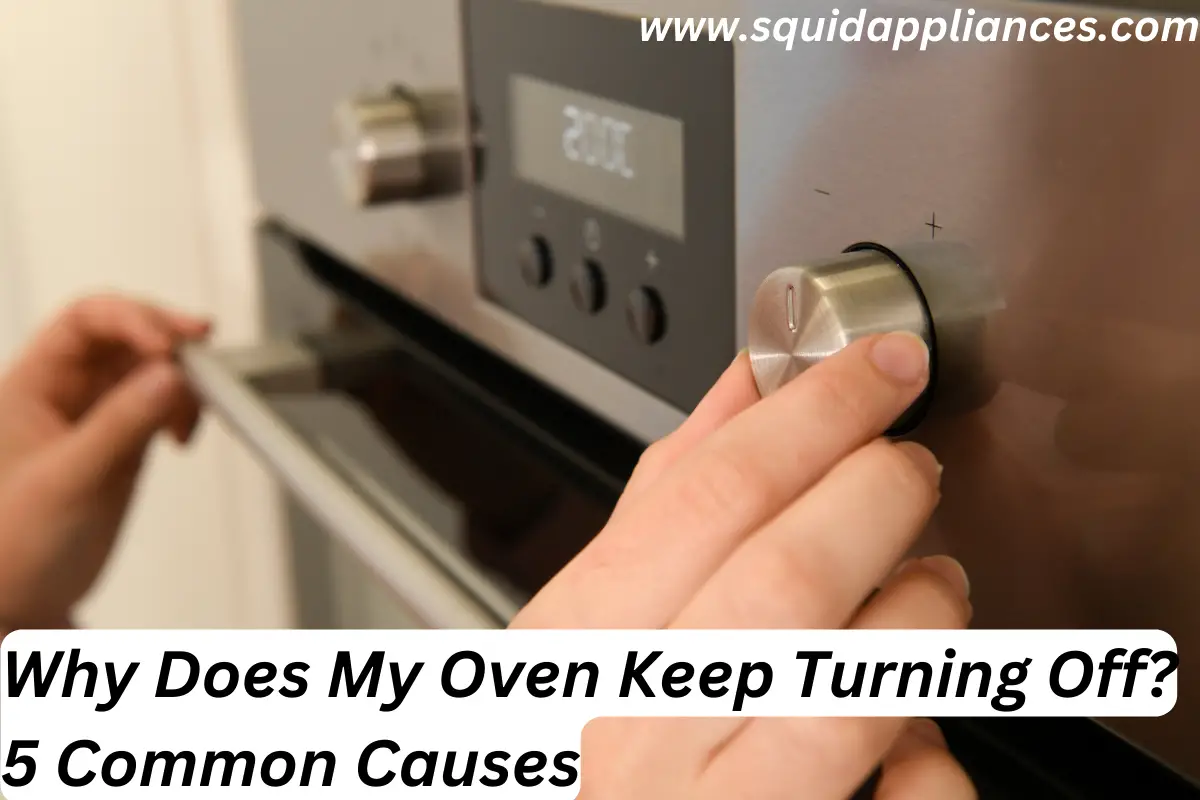Have you ever experienced the frustration of your oven suddenly turning off in the middle of cooking a delicious meal? If so, you’re not alone. Many homeowners encounter this issue, and understanding the reasons behind it can save you time, money, and unnecessary stress.
In this article, I will discuss five common causes for ovens turning off unexpectedly.
One possible culprit is a faulty thermostat. This component regulates the oven’s temperature and if it malfunctions, it can cause the oven to shut down abruptly.
Another potential reason could be a tripped circuit breaker. When too much electrical current flows through the circuits, the breaker trips as a safety measure.
A malfunctioning heating element may also be to blame. Over time, these elements can wear out or become damaged, resulting in an inconsistent heat supply.
Power supply issues are another possibility; if there’s a problem with your home’s electrical system or wiring connections, it can cause your oven to turn off unexpectedly.
Lastly, overheating safety features are designed to protect your oven from excessive temperatures but may sometimes trigger false shutdowns.
By familiarizing yourself with these common causes, you’ll be better equipped to troubleshoot and resolve any issues that arise with your oven turning off unexpectedly. So let’s dive deeper into each of these potential problems and find effective solutions together!
Why Does My Oven Keep Turning Off?
“Yes, your oven might keep turning off due to various issues like a faulty thermostat, tripped circuit breaker, malfunctioning heating element, power supply problems, or overheating safety features. Understanding these causes is key to troubleshooting and preventing disruptions during cooking.”
Key Takeaways
- Faulty thermostat, tripped circuit breaker, malfunctioning heating element, and power supply issues are the common causes of an oven turning off unexpectedly.
- Understanding the causes of the issue can help save time, money, and stress.
- Troubleshooting and resolving the issues can involve seeking professional help, replacing faulty parts, resetting circuit breakers, and checking for loose connections or damaged wires.
- Regular maintenance tips include cleaning the oven and vents, avoiding unnecessary opening of the oven door, using appropriate cookware, and checking the oven thermostat calibration.
Faulty Thermostat
Don’t worry if your oven keeps turning off, it could be due to a faulty thermostat! A faulty thermostat can pose temperature regulation challenges and significantly impact cooking precision.
When the thermostat malfunctions, it fails to accurately detect and maintain the desired temperature in the oven. This can result in undercooked or overcooked meals, causing frustration for any home cook.
Therefore, it’s important to address this issue promptly by seeking professional help or replacing the faulty thermostat.
Tripped Circuit Breaker
Check if you’ve accidentally tripped the circuit breaker for your oven. A tripped circuit breaker can cause your oven to turn off unexpectedly. This electrical malfunction occurs when there’s an excessive flow of electricity, causing the breaker to shut off to prevent damage or fire hazards. It can be triggered by a power outage or even by using multiple high-powered appliances simultaneously on the same circuit.
Make sure to reset the circuit breaker and avoid overloading it in the future.
Malfunctioning Heating Element
If your oven’s heating element is malfunctioning, you’ll want to get it fixed right away so you can enjoy perfectly cooked meals again. Here are some repair options and troubleshooting tips to consider:
- Call a professional technician: An experienced technician can diagnose the issue accurately and recommend the best course of action.
- Check for visible damage: Inspect the heating element for any signs of physical damage or wear that may require replacement.
- Test with a multimeter: Use a multimeter to check if the heating element is receiving electrical current properly.
Remember, addressing a malfunctioning heating element promptly will ensure your oven operates efficiently and safely.
Power Supply Issues
Experiencing frequent power outages? You might want to consider investigating the power supply as the culprit. Power supply issues can cause your oven to turn off unexpectedly and disrupt your cooking routine.
To troubleshoot this problem, check if there are any loose connections or damaged wires in the power cord. Additionally, inspect the circuit breaker and ensure it’s properly functioning.
These common symptoms can help you identify and resolve power supply issues with your oven.
Overheating Safety Features
Ensure that your oven’s overheating safety features are functioning properly to prevent any potential hazards or accidents. Understanding oven temperature control is crucial in maintaining a safe cooking environment. Here are some tips for preventing oven overheating:
- Regularly clean the oven and its vents to ensure proper airflow.
- Avoid opening the oven door unnecessarily, as it can cause heat loss.
- Use appropriate cookware that matches the size of the food being cooked.
- Check that the oven thermostat is calibrated correctly.
- Consider installing an external thermometer to monitor and regulate the oven’s temperature accurately.
Frequently Asked Questions
How can I test if my oven’s thermostat is faulty?
To test if your oven’s thermostat is faulty, you can use a multimeter to measure its resistance. Disconnect the power, remove the thermostat, and check for continuity between the terminals. If there is no continuity, the thermostat may be faulty.
What should I do if my oven keeps tripping the circuit breaker?
If your oven keeps tripping the circuit breaker, there are a few troubleshooting tips you can try. First, make sure the oven is properly connected to a dedicated circuit. If that doesn’t work, have an electrician check for any electrical issues. Always follow electrical safety precautions.
Can a malfunctioning heating element cause the oven to turn off completely?
Yes, a malfunctioning heating element can cause the oven to shut down completely. When the heating element fails, it can result in a loss of power and cause the oven to turn off abruptly.
Are power supply issues a common cause for ovens turning off?
Power supply issues, such as a power outage or faulty wiring, can be common causes for ovens turning off. These problems disrupt the flow of electricity to the oven, resulting in it shutting down unexpectedly.
What are some signs of overheating safety features in an oven?
Some signs of overheating safety features in an oven include the oven automatically turning off, a flashing error code on the display panel, and the display panel becoming hot to touch. Troubleshooting a faulty thermostat can help resolve these issues.
Conclusion
In conclusion, when your oven keeps turning off, there are several common causes to consider. One possibility is a faulty thermostat, which may need to be replaced.
Another potential issue could be a tripped circuit breaker, requiring you to reset it.
A malfunctioning heating element might also be the culprit, necessitating a repair or replacement.
Power supply issues should also be investigated and resolved accordingly.
Lastly, overheating safety features could trigger the oven to shut off as a precautionary measure.
By addressing these common causes, you can ensure that your oven functions properly and avoid any further interruptions during cooking or baking.






